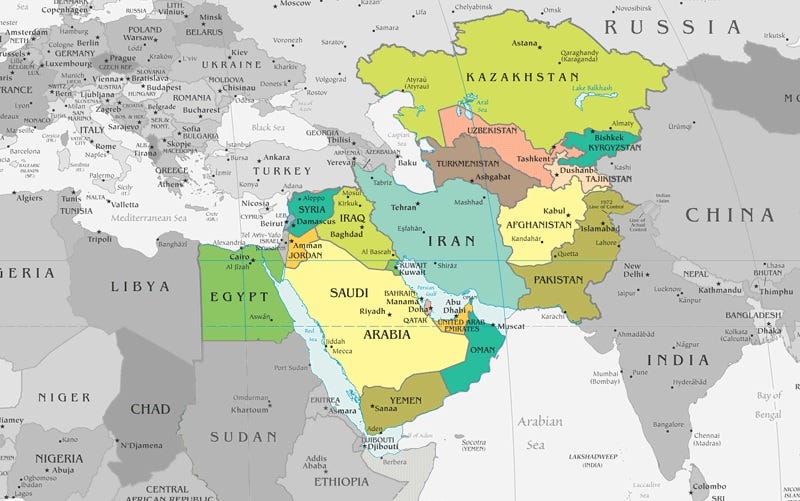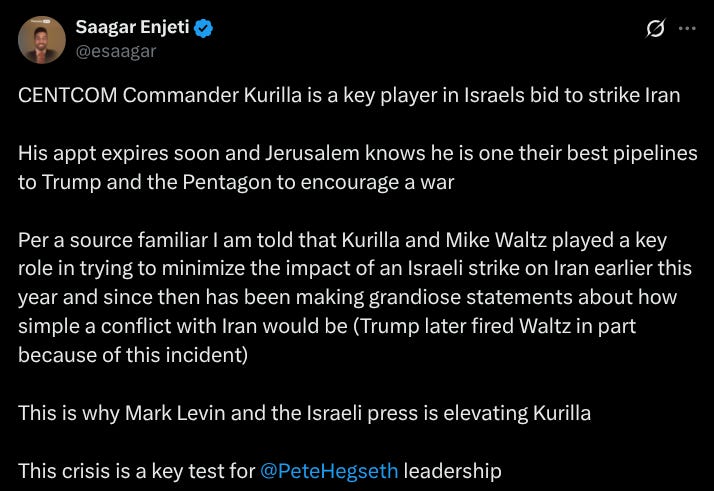Gen. Michael Kurilla and the Pivot to Asia
Part 1 of 3: In America's Great Game, what role does Gen. Kurilla play?

“Kurilla is especially close to Israel, even by the standards of other American officials”
—Huffington Post
Who’s In Charge?
Who’s really in charge of all these wars, the U.S. or Israel? Which is the client state and which the master? The question comes up, not because it’s being asked, but because the answer is assumed and no one can agree.
Many assert that the tail (Israel or Netanyahu) is wagging the dog. Jeffrey Sachs is one of many with this opinion. Others, like Michael Hudson, believe that we are the boss and Israel is our “landed aircraft carrier” in the Near East.
Certainly these countries, ours and Israel, have been intertwined since that nation was created in Palestine. Joe Biden is not alone in the halls of power when he said this:
I want to look at this question — who’s really in charge? — by looking at the larger context: Why are we fighting these wars? Yes, empire (a word those in power have started to use). But that’s vague. What does this empire want, and how does it mean to get it?
These answers will take us back, ultimately, to the start of America’s Great Game, the one the U.S. began when it joined the rest of the West in chasing colonies and world domination, a game that started before Columbus set sail. (For more on this, see our still-incomplete series on Alfred McCoy’s To Govern the Globe. The intro is here. The rest of the pieces are here.)
But those are background ideas on how we got here. We’ll cover them in due course. How are we affected today? Is Israel a pawn in America’s Great Game of control? Or has Israel so captured the centers of DC power that we’re serving its needs even as we ignore our own?
I’m going to take this on in three separate chunks. This is the first. It won’t answer our question alone, but it features a central player, General Michael “Erik” Kurilla, current commander of CENTCOM, the Pentagon’s Central Command, responsible for the area shown in the map above. CENTCOM and Gen. Kurilla are linchpin players, as you’ll see.
The second piece will detail the grand strategy as it’s evolved today and show why Iran is the focus of all this attention. The third will look at Iran from inside the country, the problems it faces, the challenges it must overcome.
So let’s start, with General Kurilla.
Kurilla’s Focus on Israel and Iran
General Michael Kurilla, CENTCOM commander, is widely considered essential to Israel’s plan to attack Iran.
For those who don’t know, Saagar Enjeti (above) is well connected in right-wing circles, having come through the Tucker Carlson right-wing media channels. He’s strongly opposed to the war.
There’s quite a bit more on Kurilla from the still-running Huffington Post:
The Pro-Israel U.S. General Quietly Influencing Trump On Iran
Gen. Erik Kurilla “had better information about what [Israel was] up to ... than anyone else in our government,” a former U.S. official told HuffPost.
…The choice to participate in a war against Iran still rests with Trump, but the military build-up suggests the increased influence of the member of his national security team who may be most supportive of an Israeli-American operation against Iran: Michael “Erik” Kurilla, the U.S. military commander for operations in the Middle East.
People familiar with Kurilla told HuffPost he is especially close to Israel, even by the standards of other American officials who have worked with the longtime U.S. partner. That proximity has largely been to Israeli military and intelligence officials who have long treated Iran as an incontrovertible neighborhood threat — while the U.S., further away and with its own interests, has attempted diplomacy with Tehran.
“He had better information about what they were up to and what they were seeing in their intelligence before we got it than anyone else in our government,” said a former U.S. official, who requested anonymity to speak frankly.
Things to note from this article:
“Based on my experience with [Kurilla] ... he takes a fundamentally different view of the importance of the Middle East than a lot of other people”, says Dan Caldwell, a former Trump Pentagon appointee.
Kurilla “repeatedly visited Israel to coordinate U.S. cooperation in its brutal subsequent military operations in the Gaza Strip and Lebanon”.
He has “clashed with political appointees at the Pentagon who have sought to redirect the military’s attention to Asia.”
He sees “Israel’s pummeling of its enemies” as a “model for U.S. military choices.”
This leads us to one of two conclusions, perhaps both of them. The first: Kurilla is an Israel hawk plain and simple, a Zionist through and through.
But the second, more interesting for our purposes, has to do with his views on the Middle East. Some in the Trump administration see China as our next big challenge — as Obama did, by the way — and they don’t want to get bogged down militarily in the Middle East. Too much effort, too far away. We’d be stretched way too thin.
But there’s an argument that Iran, with or without intending to be, is the pivotal country in America’s Great Game: You have to go through Iran (and Pakistan) first, to get at Russia and China. So deal with Iran now, goes the argument; don’t jump the gun. You’ll see that argument in the next piece.
Is Kurilla of this mind too? It’s possible, though maybe not likely. The Huff Post notes that “commanders like Kurilla have expertise in battlefield wins but not in long-term strategy”.
Still, whatever the reason he supports Israel’s attack, he may be strategically right from a hegemonic point of view. In order to execute the long-sought “pivot to Asia,” if that’s what you want, Iran may really be the first domino in line, and skipping it could be a mistake.
More in the next piece.





The best argument for Israel being the dog and USA being the tail is the whole spectacle of USA presidents going to Israel, putting on the kippah and kissing the western wall. No boss would ever engage in such public display of submission. If the relationship were the opposite, Netanyahu would be the one visiting the capitol and wearing the stars and stripes hat.
He wants his retirement bag and MIC board seats.